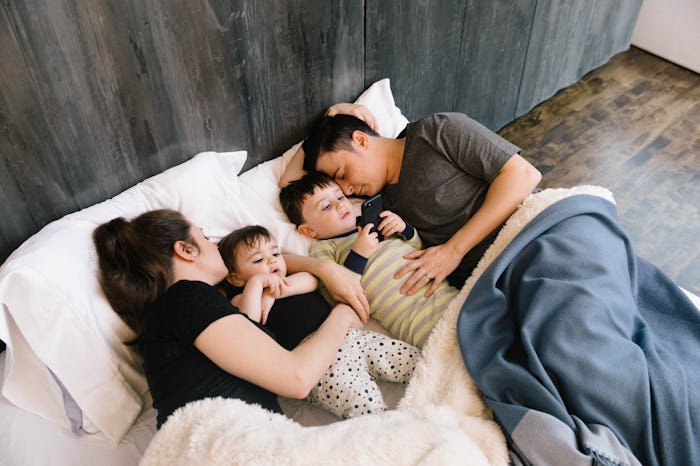During any sleep training cycle, parents struggle when choosing the method they think will work the best and cause the least amount of disruption. With so many options to choose from these days, it's no wonder new parents are overwhelmed. But for those curious about one of the more controversial options, here's why you should never cry it out with a newborn, according to the experts.
The practice of "cry it out," as defined by the Baby Sleep Site, is a sleep training method used to break poor sleep associations. The site goes on to say crying it out is about setting limits on what's allowed, and what's not allowed, at sleep times. It's not an alternative to parenting, and it's absolutely not meant to deny a hungry, wet, or sick baby anything they need. Instead, crying it out is a tool better used conservatively and in conjunction with responsible, compassionate parenting. Instead, the method teaches baby how to self-soothe, as opposed to leaning on crutches such as pacifiers, rocking, or nursing. According to The Baby Sleep Site, you should not try cry it out when a baby is too young, either. in fact, the site goes on to recommend that for all infants, and even babies 4 to 6 months of age, parents should choose gentler options when trying to establish sleep schedules.
According to Dr. William Sears, MD and author of multiple baby advice books, babies — especially newborns — cry as a means of communication. If parents let them continue crying, hoping they'll settle themselves, they can develop trust issues. Not only could your baby learn the cries provide no response, he or she may condition themselves to think their cry has no value. This could create a lot of potential issues in the immediate, and down the road. Psychology Today confirms, saying:
With neuroscience, we can confirm what our ancestors took for granted — that letting babies get distressed is a practice that can damage children and their relational capacities in many ways for the long term. We know now that leaving babies to cry is a good way to make a less intelligent, less healthy but more anxious, uncooperative and alienated persons who can pass the same or worse traits on to the next generation.
According to What To Expect, some of the problems associated with letting a newborn cry it out may be denying them food when hungry, leaving them in a soiled diaper, ignoring a physical ailment that should be soothed, ignoring whether or not they're too hot or cold, and even avoiding a plea to be comforted or swaddled snug. Newborns aren't capable of needing too much, as they're only getting acclimated to life outside the womb. The Mayo Clinic suggests ruling out colic — frustrating periods of intense, inconsolable crying — but attending to your newborn's needs as they happen and preemptively to help prevent unnecessary crying from needs not being met.
While a recent study at Flinders University in Adelaide, Australia found that letting babies cry it out may not cause harm, and may actually be beneficial in sleep training older babies, newborns are not included in the roundup. For all parents left wondering if letting your newborn cry it out is the way to go, and while there isn't a definitive answer on sleep training babies 4-6 months and older, experts all seem to agree attempting that this particular sleep training method at the newborn stage isn't advisable. Instead, aim to meet — and exceed — your new baby's needs.
Before you know it, they won't be a newborn any more and you can start implementing the best sleep training practice and/or sleeping arrangement for you, your baby, and your entire family.
